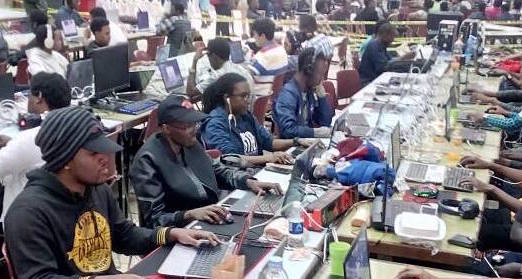Greater access to high-speed internet, a growth in local gaming content and thriving gaming communities are all creating the perfect storm for Africa’s gaming scene.
Gamers are a passionate bunch. Last July, over 3000 comic book, gaming, animation and movie fans descended upon the Nairobi Comic Convention (Naiccon) for two days of creative workshops, cosplay competitions and gaming tournaments. With a total of 16 PC and console gaming teams competing from Kenya, Uganda and Rwanda, the gamers arrived at 9AM and played straight through the night until 7PM the following day when the event closed.
And it is precisely this sort of enthusiasm that is helping to turn gaming from a hobbyist, grass roots movement into an exciting new industry for many African countries. While South Africa has an established gaming scene – complete with large expos and established gaming communities – there is now pent-up demand from gamers across the rest of the region.
Change is underway. According to gaming analyst firm Newzoo, estimated gaming revenues in Egypt ($205 million) and Nigeria ($168 million) surpassed South Africa ($118 million) in 2017.
Revenues are growing elsewhere in the region – Kenya, for example, had estimated gaming revenues of $30 million last year, while Morocco had $86 million.
From grass-roots level up
Much work is currently being done at grass-root level to raise the profile of gaming and address some of the barriers to entry.
Greater internet access has played a significant role in enabling more of the population to play games – be it on their mobiles, consoles or personal computers. But there is still a major divide between gamers in Africa and the rest of the world. The rollout of additional fibre will play a key role in satisfying the demand for real-time, multi-player games, which rely on fast and consistent internet speeds – as even a minor delay or disruption in speed of service can cause a major impact to a game. Throughout Naiccon, for example, Liquid Intelligent Technologies supported the multiplayer gaming tournament with unlimited bandwidth, with usage peaking at 750Mbps and never dropping below 100Mbps. “The internet provision was the best the gamers had ever experienced the event,” said Naiccon organiser Thomas Imboywa, who launched the first event in 2014 when he and his
friends were unable to attend Comic-Con in San Diego. “The tournament was streamed live on Twitch, YouTube Gaming and Facebook, while gamers connected directly to Liquid Intelligent Technologies servers to play the games.”
This quality of the network at the event has helped inspire more gaming communities to attend the next Naiccon event in August: “The reception to last year’s event was awesome, and now we have gaming communities from Ethiopia, Zambia and Zimbabwe who would also like to come compete at the 2018 tournament,” says Imboywa. “Right now we’re very excited – it’s an amazing time for e-Sports globally and in Africa.”
Online multiplayer gaming requires dedicated servers, which have so far been missing in many African countries. Multi-player gaming communities like GamersNights in Uganda have been instrumental in not only bringing together enthusiasts, but also in addressing the challenges facing African gamers. “In Africa, a key problem is latency,” says Kyle Spencer, a founder of GamersNights and an Internet technology specialist focused on African infrastructure, content and policy development. “Prior to launching our own servers in 2009, gamers in Uganda would experience delays of 600 millisecond or more when playing online. The East African region was still connected to the rest of the world via satellite and all of the gaming servers were hosted on other continents. This made it impossible to play. The arrival of submarine cables helped to reduce this delay, but the round-trip time to Europe is still 250 milliseconds or more.”
GamersNights initially hosted East Africa’s first online gaming servers on a private hospital network they had access to in Uganda. They hosted events and encouraged other gamers in the country to connect. In 2012, GamersNights partnered with Liquid Intelligent Technologies and moved the servers to their network in order to take advantage of their rapidly expanding regional fibre-optic network. This made it possible for players from other countries to compete on the same servers for the first time ever. These are the very same servers used by gamers at last year’s Naiccon.
Tapping into local content
Another important contributor to any gaming scene is local gaming content. Game developments studios have emerged in many African start-up hubs, including South Africa, Nigeria, Ghana, Kenya and Zambia.

Take The Innovation Village; a hub and co-working space in Kampala, which has seen a rise in the number of gaming developers using its facilities. “We have a community of gaming developers building content for businesses and stakeholders,” says CK Japheth, CEO and co-founder of The Innovation Village. “But we also have a community of hard-core gamers who are into eSports. Recently both communities have discovered they have much in common and can learn from one another.”
And it seems gaming is in vogue with the investor community right now: “The gaming developers attract a lot of interest from visitors to the hub, which are typically investors or businesses. They want to know how to gamify their content,” says Japheth.
Investors will be attracted further by stories like Matatu. Developed by Kola Studios, the mobile app is based on a popular local Ugandan card game, and today has over 200,000 game downloads on Google Play store and more than 90,000 monthly active users. “The game is very specific to Uganda and has been played here for a very long time. It is important to have that familiarity when it comes to new products,” says Sharon Rwakatungu, Operations Manager at Kola Studios.
Kola Studios has since been trying to expand its portfolio by launching other games in Uganda and East Africa, as well as building games for corporate clients. “Making popular games is one thing but building a sustainable business is another,” says Rwakatungu. “The appetite for gaming is growing, and our downloads keep increasing as smartphones and tablets become more affordable. But many businesses are still hesitant to advertise on a game, which is holding the market back a bit.”
As one of the only virtual reality (VR) production companies in East Africa, BlackRhino is also trying to find new ways to increase investment in gaming. Established in 2014, the company specialises in creating cinematic immersive experiences for different companies and organisations, while at the same time developing its own unique local VR content. Facebook’s $2 billion acquisition of VR start-up Oculus Rift in 2016 certainly helped raise interest in VR, but there is still some market education to be done across the region: “We are trying to demistfy the technology,” says Brian Afande, Black Rhino’s Head of Business Development. “Our aim is to make Africa’s unique experiences and cultural heritage accessible to everyone in the world through the power of VR.”
BlackRhino is doing this in two ways. Firstly, it has a growing portfolio of corporate customers, and has created local VR content for the likes of UNICEF, Shell, Safaricom and Kenya Wildlife Services (KWS). Secondly, it runs a series of workshops, hackathons and networking sessions aimed at exploring new use cases for VR across East Africa. “For example, we think VR can play a big role in education and we’re currently building Africa’s first VR educational platform,” says Afande. “We’ve also started a non-profit organisation called ‘VR Without Borders’, where we go visit local communities and provide them with VR experiences.”
Afande sees the next few years as being crucial for raising the profile and investment in VR. “We need investors to come and see that VR can be an important industry in East Africa, and that we can develop world-class VR solutions. From real estate to sports, VR can have an impact in every facet of our economy.”
Africa’s first eSports stars
A generation of local eSports stars would certainly help raise the profile of gaming further in Africa. And there has been considerable progress on this front. Last year Kwesé Sports, Econet Media’s premium sports content platform, signed an exclusive, five-year deal with the world’s largest eSports company ESL, to distribute ESL content and host events across Africa. The partnership saw Kwesé and ESL bring the first ever continental eSports championship to Africa, and launch the region’s first 24/7 eSports channel. “2017 was a landmark year for African gaming in almost all aspects. With Kwese bringing ESL to Africa, we were able to host the first continent-wide tournament,” says Bradley Kirby, Head of Esports at Kwesé. “Not only did this put
a vast amount of cash into the eSports prize winning ecosystem, but it also created more opportunities for talent around the periphery as we proudly showcased some incredible African talent and brought sports level broadcasting to eSports which has not been done on this continent before.” But it is not just about raising the profile of eSports in Africa. It is also about exposing more African gamers to the international scene. “We are hoping to carry on the momentum of an awesome 2017 into 2018 as we firmly put Africa on the eSports map. It is heart-warming to identify and showcase our local talent by telling these inspiring stories to our audience across Africa,” says Kirby.
Greater interest and investment in eSports will only help to bring down the digital divide between African gamers and the rest of the world. “The more numbers that we have involved in gaming, the greater the opportunities presented to everyone in the ecosystem,” says Kirby. “There has never been a better time to earn a living from gaming as there is today. From winning vast amounts of prizes, sponsorships, endorsements, content creation, streaming, vlogging etc.”
Kirby also see Generation Z as absolutely crucial in taking gaming to the next level: “From multiple screens and devices to streaming, genres and interactive content. I firmly believe that their abilities are slightly enhanced. From an increase in fast-paced and accurate reactions and reflexes to being able to track more multiple targets moving at different speeds and directions in 3-dimensional space than before,” he adds.
Talent and passion will help drive Africa’s gaming scene over the coming years, but its success also hinges on greater support from the business community. “As part of the Liquid Intelligent Technologies Innovation Partnerships strategy, we are investing together with our partners to help create a captive and engaged gaming community across Africa that will present new opportunities for the African gaming industry. We intend to attract the large gaming companies to locally host their gaming platforms in Africa, and also enable gaming entrepreneurs to create the next African-centric games,” says Ben Roberts, Group CTIO, Liquid Intelligent Technologies.






